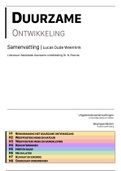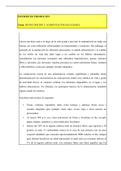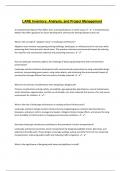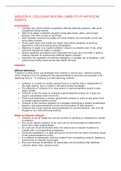Arresten:
• WABE and Müller
• Carvalho Pinto De Sousa Morais v Portugal
Principle of equal treatment: like cases must be treated alike, and unlike cases
unalike, proportionate to the differences between them. This principle guides
discrimination law.
Under EU law the prohibition of discrimination is laid down in both primary law (EU
treaties and CRFEU) and secondary law (Directives and Regulations). The anti-
discrimination provisions under EU law have direct effect in vertical relations as
long as they are precise and unconditional. With the exception of Directive
provisions, they can also have horizontal effect. EU member states are obliged to
implement anti-discrimination Directives in national law.
• Race directive: equal treatment between persons irrespective of racial or ethnic
origin. This Directive prohibits discrimination on the grounds of race and ethnic
origin
• Framework directive: equal treatment in employment and occupation. Prohibits
discrimination on the grounds of sex, race or ethnic origin, religion or belief,
disability, age or sexual orientation
• Recast directive: equal opportunities and equal treatment of men and women in
matters of employment and occupation. Prohibits discrimination on the grounds of
sex.
3 types of discrimination:
• Direct discrimination: the situation where a person is treated less favorably
than another has been or would be treated in a similar situation on the grounds of
‘a prohibited discrimination ground. 3 requirements:
• A less favorable treatment
• A similar or comparable situation
• A causal relationship with the prohibited discrimination ground.
• Discrimination by association: occurs when a person is treated less favorable
because he or she is linked or associated with a protected characteristic.
• Indirect discrimination: when an apparently neutral provision, standard or course
of action, favors persons belonging to a group that is related to the prohibited
discrimination ground over those belonging to another group that is related to the
same prohibited discrimination ground. This can be identified using statistical
differences. Not always required however because the figures often times don’t
exist.
Comparator: a person in a comparable situation. Used to identify if there is
discrimination. For example:
• Equal pay case: a women claims to be discriminated against the grounds of sex
because she’s being paid less than male colleagues. She will have to show a
comparison with a male coworker who is engaged in equal work of equal value in the
same establishment. This is not always easy because work cannot always be valued
as equal.
• With respect to the discrimination ground of religion and belief, the ECJ clarified that
the comparator should be a person with a different religion and belief, and not, a
person who does not belong to a certain religion
• With regard to the discrimination ground of race or ethnic origin, the ECJ has argued
that the comparator should be a person who belongs to a different race or ethnic
origin.
, In cases of (sexual) harassment and the instruction to discriminate and
pregnancy or maternity there is no comparator needed.
Formal equality: treating everyone the same under the law, without discrimination
or favoritism.
Substantive equality: refers to the notion that treating everyone the same may not
necessarily result in equality of outcomes, because some individuals may have been
historically disadvantaged, or have less access to resources and opportunities. There-
fore, substantive equality aims to address these underlying inequalities by taking into
account the specific needs and circumstances of different groups, and providing them
with additional support or resources to level the playing field.
In short, formal equality is based on the idea of treating everyone the same, while sub-
stantive equality is based on the idea of providing individuals with equal opportunities
and outcomes, taking into account their unique needs and circumstances.
Art. 14 ECHR: central discrimination provision. It’s an accessory right which means
that the right not to be discriminated in this provision has no independent
existence, but only applies with respect to the other rights or freedoms in the ECHR.
It’s not necessary however that this other right or freedom has been violated. As long
as a particular claim falls within the ambit of a Convention right, the central
discrimination provision may apply. This provision applies to vertical relations. It
may also have indirect horizontal effect in that a State should take measures to
prevent discrimination between private parties.
• WABE and Müller
• Carvalho Pinto De Sousa Morais v Portugal
Principle of equal treatment: like cases must be treated alike, and unlike cases
unalike, proportionate to the differences between them. This principle guides
discrimination law.
Under EU law the prohibition of discrimination is laid down in both primary law (EU
treaties and CRFEU) and secondary law (Directives and Regulations). The anti-
discrimination provisions under EU law have direct effect in vertical relations as
long as they are precise and unconditional. With the exception of Directive
provisions, they can also have horizontal effect. EU member states are obliged to
implement anti-discrimination Directives in national law.
• Race directive: equal treatment between persons irrespective of racial or ethnic
origin. This Directive prohibits discrimination on the grounds of race and ethnic
origin
• Framework directive: equal treatment in employment and occupation. Prohibits
discrimination on the grounds of sex, race or ethnic origin, religion or belief,
disability, age or sexual orientation
• Recast directive: equal opportunities and equal treatment of men and women in
matters of employment and occupation. Prohibits discrimination on the grounds of
sex.
3 types of discrimination:
• Direct discrimination: the situation where a person is treated less favorably
than another has been or would be treated in a similar situation on the grounds of
‘a prohibited discrimination ground. 3 requirements:
• A less favorable treatment
• A similar or comparable situation
• A causal relationship with the prohibited discrimination ground.
• Discrimination by association: occurs when a person is treated less favorable
because he or she is linked or associated with a protected characteristic.
• Indirect discrimination: when an apparently neutral provision, standard or course
of action, favors persons belonging to a group that is related to the prohibited
discrimination ground over those belonging to another group that is related to the
same prohibited discrimination ground. This can be identified using statistical
differences. Not always required however because the figures often times don’t
exist.
Comparator: a person in a comparable situation. Used to identify if there is
discrimination. For example:
• Equal pay case: a women claims to be discriminated against the grounds of sex
because she’s being paid less than male colleagues. She will have to show a
comparison with a male coworker who is engaged in equal work of equal value in the
same establishment. This is not always easy because work cannot always be valued
as equal.
• With respect to the discrimination ground of religion and belief, the ECJ clarified that
the comparator should be a person with a different religion and belief, and not, a
person who does not belong to a certain religion
• With regard to the discrimination ground of race or ethnic origin, the ECJ has argued
that the comparator should be a person who belongs to a different race or ethnic
origin.
, In cases of (sexual) harassment and the instruction to discriminate and
pregnancy or maternity there is no comparator needed.
Formal equality: treating everyone the same under the law, without discrimination
or favoritism.
Substantive equality: refers to the notion that treating everyone the same may not
necessarily result in equality of outcomes, because some individuals may have been
historically disadvantaged, or have less access to resources and opportunities. There-
fore, substantive equality aims to address these underlying inequalities by taking into
account the specific needs and circumstances of different groups, and providing them
with additional support or resources to level the playing field.
In short, formal equality is based on the idea of treating everyone the same, while sub-
stantive equality is based on the idea of providing individuals with equal opportunities
and outcomes, taking into account their unique needs and circumstances.
Art. 14 ECHR: central discrimination provision. It’s an accessory right which means
that the right not to be discriminated in this provision has no independent
existence, but only applies with respect to the other rights or freedoms in the ECHR.
It’s not necessary however that this other right or freedom has been violated. As long
as a particular claim falls within the ambit of a Convention right, the central
discrimination provision may apply. This provision applies to vertical relations. It
may also have indirect horizontal effect in that a State should take measures to
prevent discrimination between private parties.










